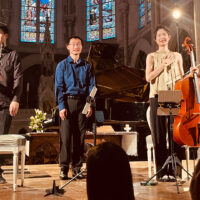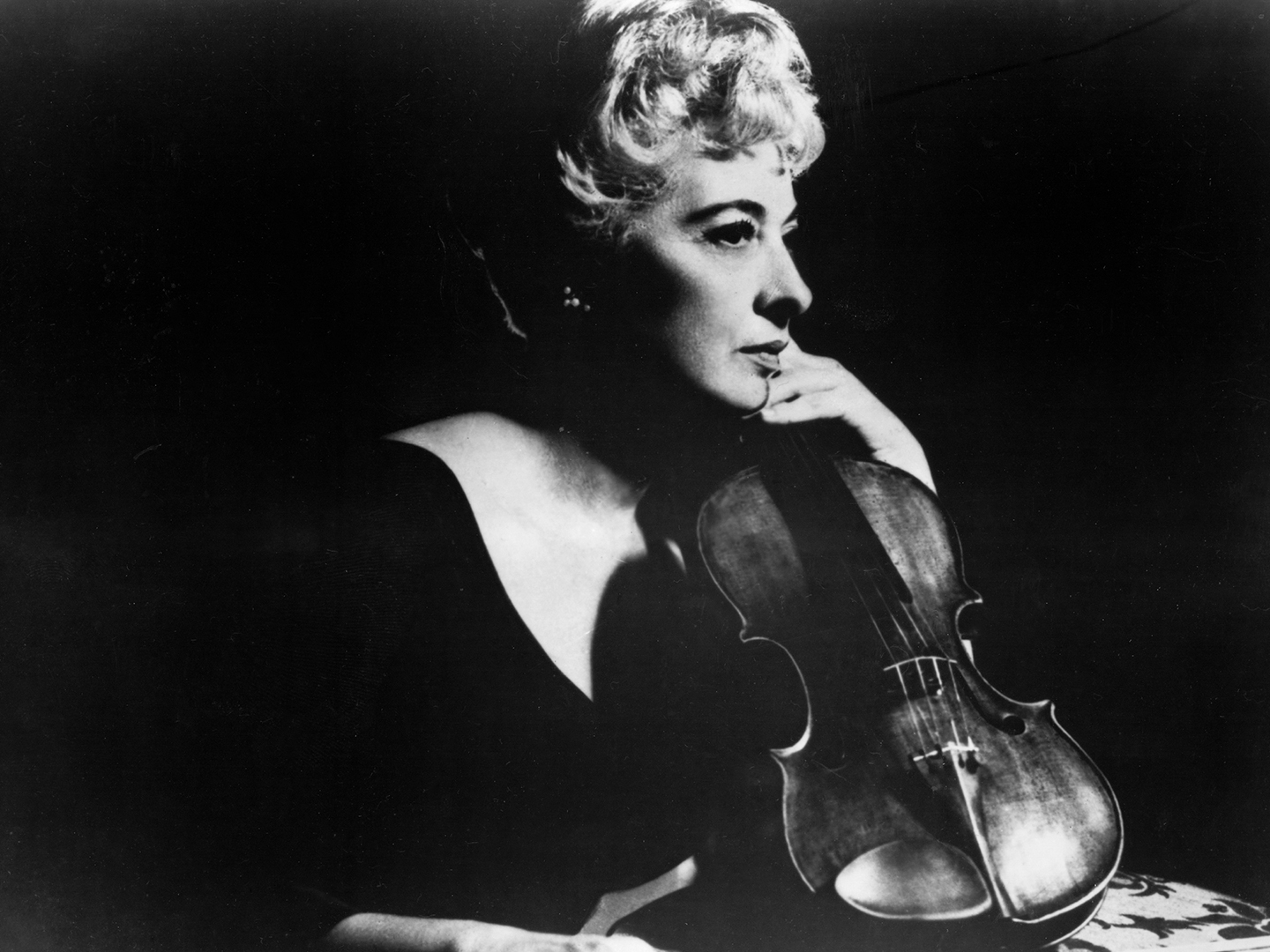
First Chair
By Deanna Gasparyan
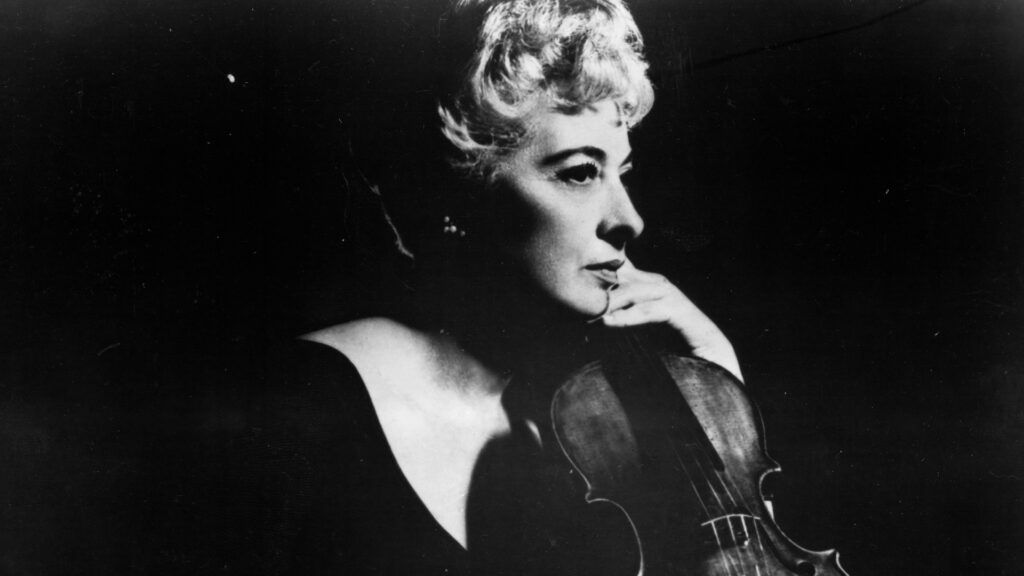
Pioneering violinist Eudice Shapiro, a longtime USC faculty member and the first female concertmaster of a studio orchestra, is remembered by her students. As part of USC’s yearlong celebration of Title IX, we are sharing the stories of USC Thornton trailblazers who have made our community, and the world, a more equitable place.
In 1942, Eudice Shapiro walked through the doors of a soundstage in Hollywood for a recording session with the RKO Studio Orchestra. Her performance was exemplary, but its significance far exceeded the film music they recorded. That session reverberated with female musicians across the country. Shapiro was the concertmaster that day, or first chair—the first woman to ever be named to that position in the studio system.
This prestigious appointment marked the start of Shapiro’s 23-year career in the Hollywood studio system, which led her to later positions with Paramount and United Artists. Her rise to prominence in the male-dominated industry would carve a path for future generations of female musicians, especially violinists.
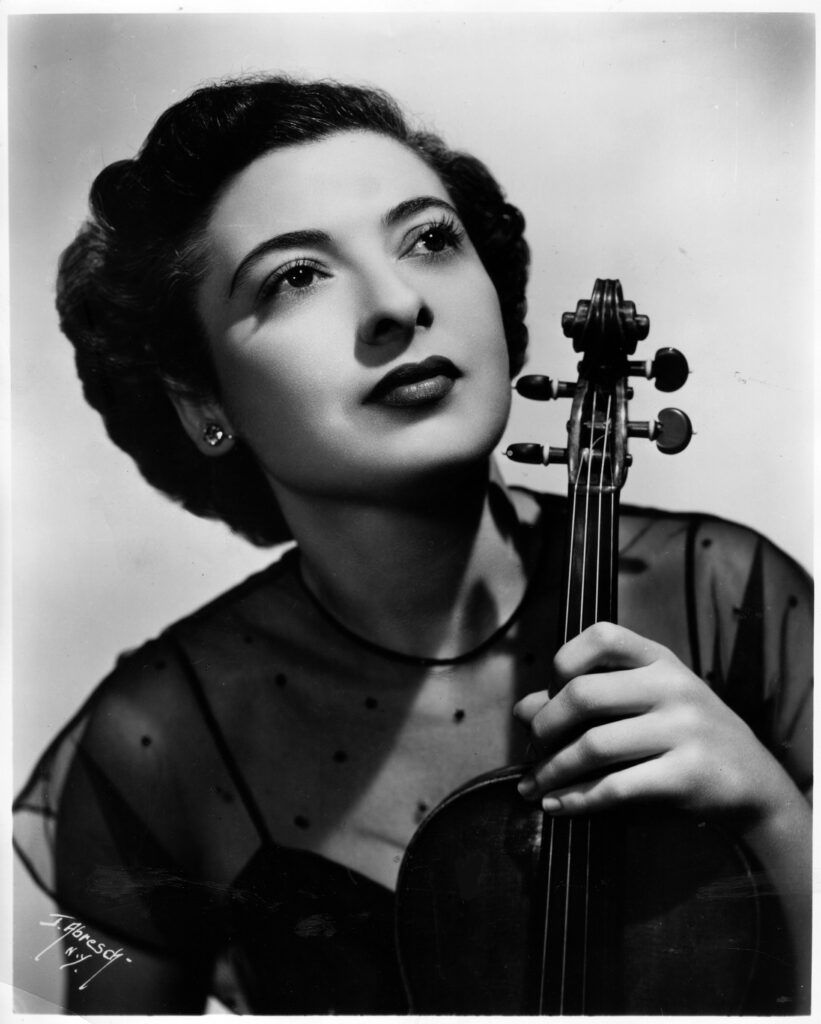
“When I first became concertmaster at RKO, I got a call from a gal in New York who had been trying to break into playing stage shows,” Shapiro said in a 2007 interview as part of a commemorative book produced by Thornton. “At that time, they were not hiring any women. Apparently, when an account of my appointment was published in a trade journal, she was able to break through and called to thank me for being the pioneer who made it easier for women to get musical jobs in New York.”
Shapiro, who died in 2007 at age 93, reached global audiences with her solos, chamber music performances and command of modern works. She established her career as a virtuoso soloist in post-war America, though she competed on an equal footing with her male counterparts. At the Curtis Institute in the 1930s, she was the only female violin student in her class, playing alongside classical music greats such as Vladimir Sokoloff. After graduation, she traveled across the country to perform in solo recitals and orchestras before being hired as a violinist in the Hollywood studios; this was at a time when the competition was great and female violinists were scarce.
She began teaching at USC Thornton in 1956 and said of her early years at USC: “Gabor Rejto was the head of the cello department and he was really just forming a staff, you know, for the strings department. He asked me if I would be interested in teaching here and I said, ‘Sure.’ He gave me two students who were not even in college yet. T.K. Wang, who just now has retired from the L.A. Philharmonic, and John Korman, who was just a youngster and later became co-concertmaster of the St. Louis Symphony.”
A concertmaster remembers his teacher
Countless USC Thornton musicians have studied under the tutelage of Shapiro, with many having gone on to build successful careers as violinists. Glenn Dicterow is one of those musicians. A celebrated concertmaster of the New York Philharmonic for 34 years, he is currently the Jascha Heifetz Chair in violin at USC Thornton.
Dicterow began playing the violin at age 8. He grew up in a musical household in Los Angeles. His father, Harold Dicterow, served as principal of the second violin section with the Los Angeles Philharmonic for 52 years. Much like his father, Dicterow began as a soloist, never intending to become concertmaster of an orchestra. Before enrolling at Juilliard, he studied with many exceptional teachers, and Shapiro was a memorable force among them.
“I had quite a few violin teachers in L.A. At that time, L.A. was a magnet for the greatest talent because of the movie industry,” Dicterow explained. “When Hitler came to power, many great musicians came here from Europe trying to survive and find jobs. Superb studio orchestras played on all the film soundtracks. As a student, I remember going to see a movie produced by Paramount Studios and the score, written by Andre Previn, had several violin solos, which I later found out were played by Eudice. She made some wonderful solo violin albums that I still possess, and I would listen to them feeling so proud that she was my teacher.”
He remembers Shapiro as his most unique violin instructor. According to Dicterow, she had a loving but firm teaching approach, so it is no surprise that many of her students knew her as “Mother Shapiro.”
“I studied with Eudice in 1965 and 1966. She was an extremely nurturing, very regal human being. She was the first of any teacher who didn’t let me copy her—I had to listen to recordings. Very much the opposite of Heifetz. I think that was the most unique thing about her, that she never demonstrated on her violin how to play anything. When I was studying with her, she said to me, ‘I never want you to imitate me. I want you to discover your own unique sound,’” Dicterow said. “She prepared me for a debut recital at UCLA Royce Hall, and after that I went to Juilliard. Interestingly enough, when I first came to USC in 2013 as a new professor, they gave me the same studio that Eudice Shapiro taught in, room 210 in Ramo Hall.”
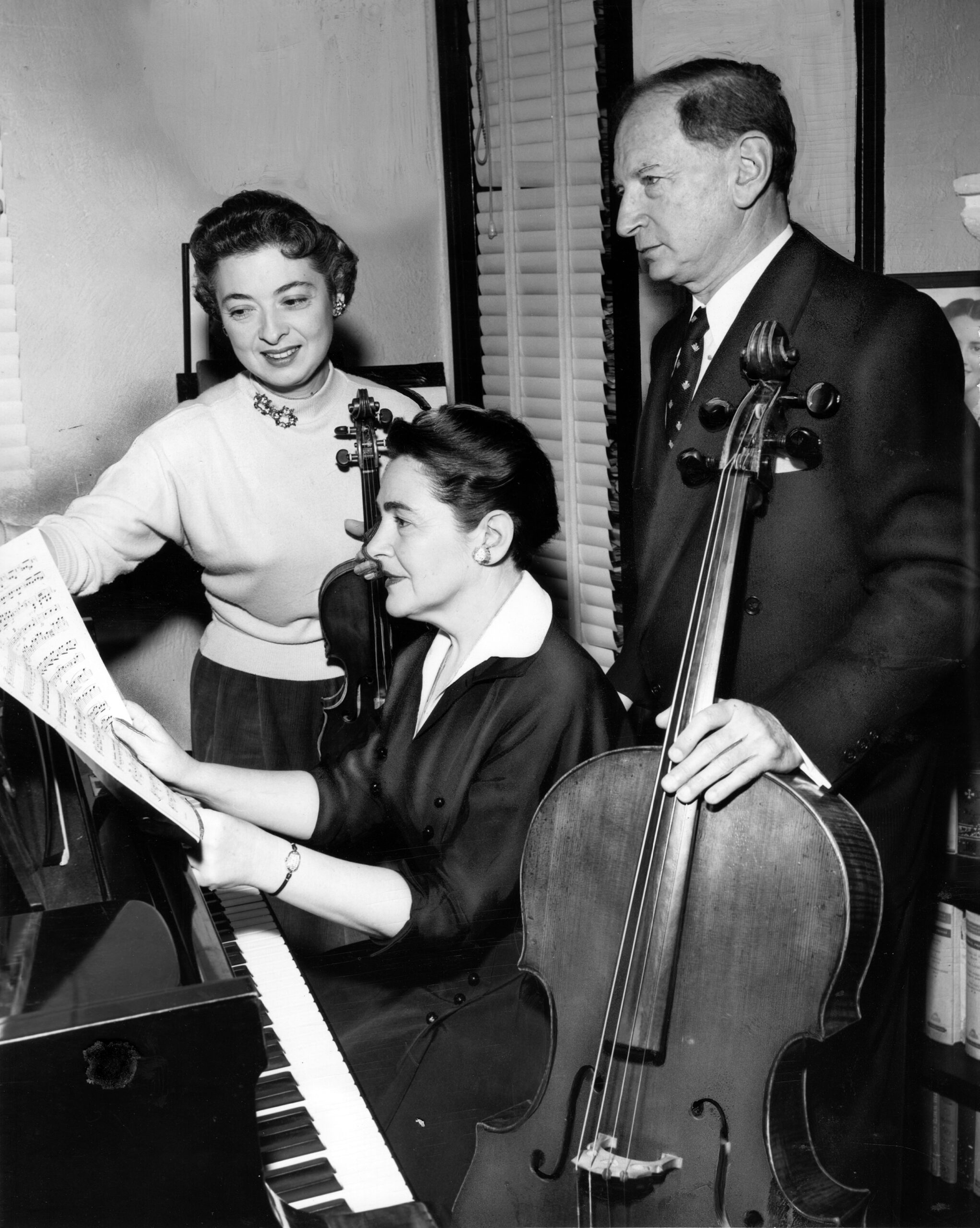
Throughout her 50 years at USC Thornton, Shapiro played a significant role in the school’s development while also shaping the musical landscape of Los Angeles. She became such a valued faculty member in the strings department that toward the end of her tenure, the school allowed her to continue teaching students from her home.
Dicterow looks back on his teacher’s successful career, underscoring her rise to first chair at RKO with the reverence of a violinist who has often performed in the same studios and orchestras.
“This is very significant because at that time, working in studios and in orchestras was mainly a boys’ club. Maybe you’d get your occasional female harp player or violinist, but things changed after Eudice got the position. It was tough for women to have their careers because they were expected to have children and be at home, so some women gave up their careers to conform to the ways of those times. It’s such a shame.”
“There were no full-time contracts offered in major orchestras until the mid-1960s,” he continued. “The studios were so attractive because they paid year-round. During the 1950s, when the Los Angeles Philharmonic was not working, my father often played Broadway shows as there was no income available during the weeks the orchestra was not in season. That’s why having a studio contract was so desirable and why Eudice Shapiro, the only female concertmaster of her era, was so unique.”
Violinist, teacher and friend
When Henry Choi (MM ’94) auditioned at USC Thornton to study with Shapiro, he had no idea of the legendary history that followed her. Leading up to his decision to explore a formal music education, he earned his undergraduate degree in mathematics with a minor in music from Occidental College. The leap from mathematician to violinist happened naturally for Choi, who grew up playing music and singing in children’s choirs. After the audition, he was admitted to Shapiro’s studio to pursue his master’s degree in violin performance.
“I was very fortunate to study with Eudice. She was referred to me by one of her students who just said she was a great teacher. She never bragged about her achievements, so when I found out she was the first female concertmaster I was like, ‘My goodness, she had this incredible history,’” Choi began. “I spent a few summers with her during the music festivals for a couple weeks at a time. Manchester Music Festival in Vermont. We would spend a lot of time together and she would coach me in my music (chamber music, orchestra, etc.). She was very easy to work with and be with, and always very energetic but very serious when it came to music-making. She was also very generous.”
Only after graduating did Choi discover his teacher’s pioneering career. To honor her 50 years of teaching and performing, and her immeasurable impact on music, he and his family established the Eudice Shapiro Endowed Violin Scholarship at USC Thornton.
“When I graduated, I found out she had worked at USC for 50 years. I thought that was really incredible, so I talked to the school to see if there was anything I could do for her before I left. I wanted to commemorate her legacy and her longevity as an educator, as a teacher. I thought endowing a scholarship in her name would benefit generations of students to come and carry on her legacy at USC.”
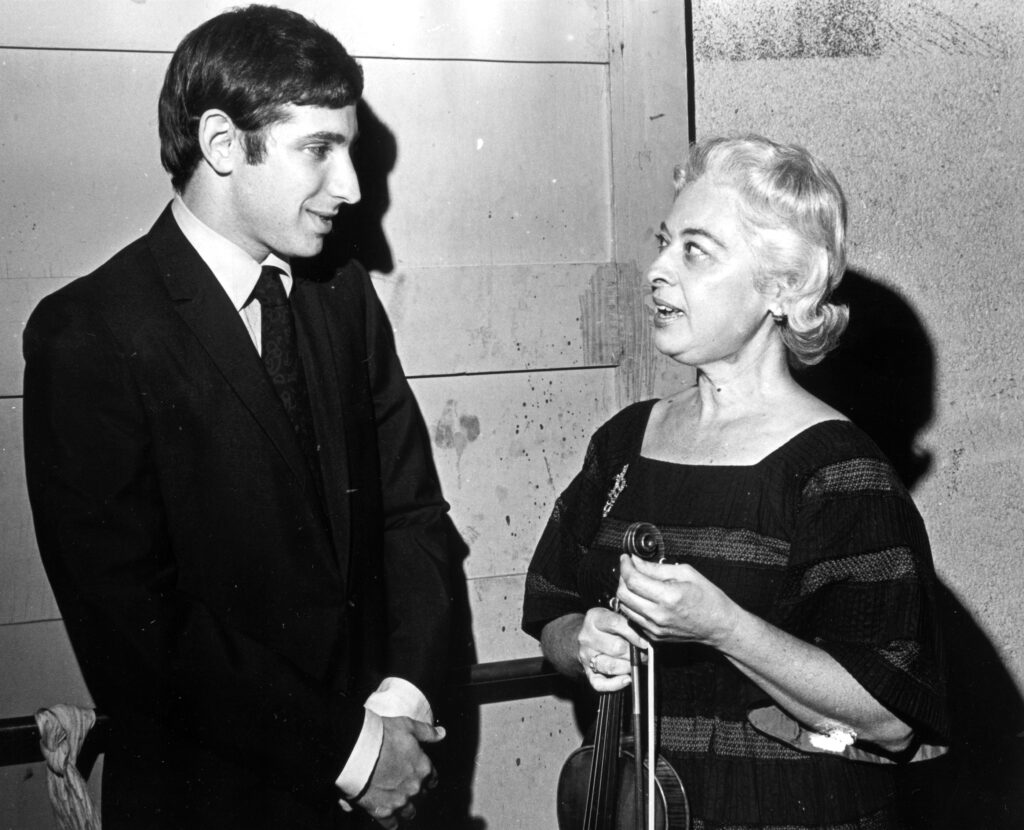
Toward the end of her life, Shapiro was surrounded by students for whom she was more than just a teacher—she was also a friend.
“I got to spend more time with her at her home with a few other students at the later stage of her life, and helped out around the house in Studio City,” Choi continued. “She just held up a great spirit and would always be happy to see us. I never felt that she was going to be going away any time soon.”
Eun-Sun Lee (DMA ’94), a classmate turned friend of Choi’s and a music professor at Wofford College, has had similarly impactful memories of her studies with Shapiro, highlighting the generosity, motherly affection and wisdom that she was known for.
“Upon my early graduation from high school, Eudice accepted me as a full scholarship student with a stipend at the University of Southern California,” Lee said. “After a year, when I was accepted to study with Dorothy DeLay at The Juilliard School, also on scholarship, she was bitterly disappointed that I was leaving her and wouldn’t talk to me for years! Eventually, after a few years, she forgave me for leaving and, when I was meandering in New York City after graduating from Juilliard with a bachelor’s and master’s degree but without knowing what to do next, she invited me to pursue a doctorate degree as her assistant at USC. At the time, I thought the last thing I wanted after intense study at a place like Juilliard was to go and collect more ‘M’s’ (BM, MM, DMA), and I could not have known how much impact that decision would have in my life.”
“Had it not been for Eudice’s affection and generosity, I would not have held the teaching positions and enjoyed the career and family life that so many of us, especially women, take for granted today. She was such a proud mentor and ‘mama’ when she came to conduct a masterclass at a college where I was teaching at the time and, needless to say, her presence raised my stock much higher there.”

